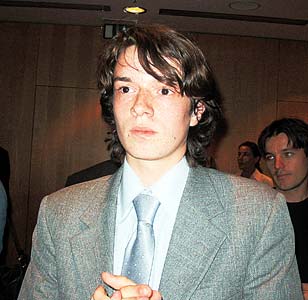10-grade student from Vologda is the best chemist of the world
 Every year teams of Russians students win dozens of gold medal at international contests in school subjects.
Every year teams of Russians students win dozens of gold medal at international contests in school subjects.
However, talented Russian students do not receive any support from the state.

Where does genius come from?
Contest in school subjects are conducted in districts, towns and cities, and their winners are invited to participate in the national Russian contest.
”We select 20 - 30 students – winners of local contests as candidates for Russian national team”, says Chief of the National Team of Russian students in computer science, associated professor of Moscow Institute of Engeneering and Physics Vladimir Kiryukhin. “Twice a year, the students-candidates for the Russian National Team, are invited for meeting sessions, and from there the members of the team are selected”. However, it is very hard to raise money for the trips to attend the sessions, and the schools unwillingly let the students leave for the sessions.
International contests for school students
Young geniuses from all over the globe take part in such contests. There are 2 tours – a theoretical tour and an experimental tour. The competition is extremely tough, the winners are often ahead by only hundreds or dozens of a point. The winners are awarded with gold, silver and bronze medals – the top 10% of students receive gold medals, 20% receive silver medals and 30% are awarded with bronze medals.
Where are champions born?
The absolute champion of summer 2004 international contest is Aleksei Zeifmann from Vologda (on the photo). He surpassed the other best students by 2 points – a major achievement for such a competition. Teachers from Vologda - Aleksei Lisitsyn and Mikhail Tikhonov were the tutors for the best young chemist of our planet.
In Moscow, Aleksei’s supervisor is the associate professor of Moscow State University, Chief of Russian National Team Vadim Eremin. He says that Aleksei had an aspiration to win for a long time, and was more persistent than the other students. He solved many problems on chemistry and was working in a school lab every day.
Aleksei’s mother said that the first thing he did after returning home from the contest was meeting his girlfriend and schoolmates. He looks more self-confident after his victory, the mother says.
What awaits the genius?
Aleksei has not discussed his plans for the future with parents so far. He has a choice – to study at Moscow State University (which gladly accepts brightest students) or to study in the West. Foreign “headhunters” offer tuition in a university to the brightest young Russians during the contests. Finally, many talented boys and girls end up in Western scientific centers.
”Getting oneself involved in contests means abandoning all other school subjects and working extremely hard”, says the alumnus of Moscow State University, School of Biology, winner of international contests on biology Yury Polikanov.
Yury’s victories at the contests opened the doors of Moscow State University for him. When a university student, he was working on his own research and was preparing the team of school students for contests. When he was a senior, he went to the USA to do experiments and tests for his diploma thesis. Soon he was invited to a US graduate school, offered a perfectly equipped laboratory and $20,000 annual stipend.
”I wish I could make the same money in Russia”, says Yury. “I would be glad to be a professor at Moscow State University in this case”.
The only Russian organization providing support to the “bright” school students, is the Charity Foundation by Vladimir Potanin. The Foundation arranges special psychological training sessions for students before the beginning of international contests, and pays 2,500 roubles per month stipend to the winners of international contests while they study at universities. The Foundation’s home page is www.stipendia.ru
Statistics - Results of Russian students at international contests on school subjects in 2004
Physics
(South Korea, July 15 - 23)
4 silver medals; 1 bronze medal.
8th position among all teams.
Mathematics
(Greece, July 9 - 18)
4 gold medals; 1 silver medal; 1 bronze medal.
3rd position among all teams.
Chemistry
(Germany, July 18 - 27)
1 gold medal; 2 silver medals; 1 bronze medal.
5th position among all teams.
Biology
(Australia, July 11 - 18)
2 silver medals; 2 bronze medals.
2nd position among all teams.
Svetlana Danilova
Subscribe to Pravda.Ru Telegram channel, Facebook, RSS!


